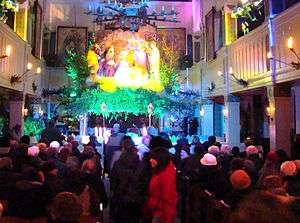Pasterka
| Pasterka, the Midnight Mass | |
|---|---|
|
Pasterka celebrated in Aleksandrów Łódzki, 2009 | |
| Classification | Catholic Church |
| Theology | New Testament |
| Region | Poland |
| Other name(s) | Shepherds' Mass |
Pasterka is a Midnight mass celebrated by Roman Catholics during Christmas between 24 and 25 December across Poland.[1] A close translation of the name would be the "Shepherds' Mass" (literally: 'that which belongs to the shepherds' in Polish), in reference to the Biblical shepherds, who were visited by an angel and told of the birth of Christ. During the Pasterka Mass, Polish people sing traditional kolędy,[2] Christmas carols from the Roman calendae) in the spirit of joy.[1]
Celebrations
Although Pasterka mass is closely associated with the specific time in Christian liturgy, it is not the actual hour of the night that predicates its meaning. According to Polish ordinance of the Eucharist, the Pasterka is defined only by the type of prayer and biblical texts used during Christmas celebrations. It can be held more than once on December 24, in more than one location by the parish priest; at the church and at a nearby chapel.[3] Often, there are two (or even three)[4] Pasterkas celebrated next to each other – earlier ones for the families with children, then at 9 and 10 p.m. for the youth, and a final one at 12:00 midnight,[5][6] for the adults.[3]

The participation in the Birth of Christ celebrations is obligatory for all practicing Catholics. They have the option of attending any one of the evening masses or even more than one. Priests may refer to all of them as Pasterka,[3] even though formally they are called Wigilia masses by the episcopate as opposed to the grand mass at midnight.[7] The exact hour of the birth of Christ is not written in the canonical gospels, which allows for choosing the ideal time for ritual prayer on that occasion.[4] On Christmas Eve (December 24) and on Christmas Day, the masses can be celebrated from three different liturgical texts, each suited to a specific sacrament of the Eucharist.[8] In the early hours, the worshippers can attend the Advent waiting mass, which does not excuse them from participating in the Nativity mass for the Birth of Christ later on.[3]
There are no masses in the late afternoon on December 24, which is the time for Wigilia, the traditional supper at family homes. The first evening mass of the Christmas Eve (after the Wigilia) is celebrated around 4 p.m. or later before 8 p.m. followed by the 10 p.m. mass and the one-hour-long grand Midnight Mass, which begins at 12. Music for the Midnight Mass begins as soon as the doors open at 11:00 p.m. The Blessing of the Crib can take place before,[6] or after the homilies, when the priests open the Szopka nativity scenes set up by the main altar.[9] Traditionally, the service concludes with an Apostolic Blessing.[10] The next day masses are interchangeable according to scripture, allowing for flexibility in choosing the religious services by individual parishioners. The Christmas Day begins with the early morning mass followed by daytime masses.[3]
Pasterka is a Catholic mass specific to the Birth of Christ celebrations in Poland. Participation in Pasterka is synonymous with Christmas. Many practicing Catholics visit the Church twice on that occasion and are encouraged by the priest to do so.[3]
 |
Polish traditional Christmas carol
|
| Problems playing this file? See media help. | |
See also
- Polish Christmas carol Bóg się rodzi (God Is Born)
- Christmas worldwide
References
- 1 2 Ann Hetzel Gunkel. "Pasterka, the Midnight Mass". Polish Christmas. Polish Christmas Traditions. Retrieved December 19, 2012.
- ↑ Roman Mazurkiewicz (2012). "Z Dziejów Polskiej Kolędy". Opracowania (in Polish). Staropolska On-line. Retrieved December 19, 2012.
- 1 2 3 4 5 6 Rev. Jacek Kędzierski. "Pasterka przed północą... (Pasterka before midnight)". Przewodnik Katolicki 02/2009 (Catholic Guide) (in Polish). Drukarnia i Księgarnia św. Wojciecha. Retrieved December 19, 2012.
- 1 2 "Tradycyjna pasterka". Święta Bożego Narodzenia (in Polish). Boże Narodzenie. Retrieved December 19, 2012.
- ↑ "The Shepherds' Mass". Polish American Liturgical Center.org. 2008. Retrieved December 21, 2012.
- 1 2 Detroit Archdiocese (December 20, 2010). "Midnight Mass at the Cathedral". Celebrate Christmas. Detroit Catholic Church. Retrieved December 21, 2012.
- ↑ "Narodzenie Pańskie. Uroczystość". Internetowa liturgia godzin (in Polish). Konferencja Episkopatu Polski i Wydawnictwo Pallottinum. Retrieved December 25, 2012.
- ↑ "Pasterka". Zwyczaje Bożonarodzeniowe. Polska Parafia Luton / Dunstable, 2007. Retrieved December 19, 2012.
- ↑ "Pasterka w katedrze (Pasterka at the Cathedral)". Duszpasterstwo (in Polish). Archidiecezja Łódzka. December 25, 2011. Retrieved December 19, 2012.
- ↑ Robert Delaney (December 17, 2010). "Midnight blessing by Archbishop Vigneron". The Michigan Catholic. Retrieved December 21, 2012.
